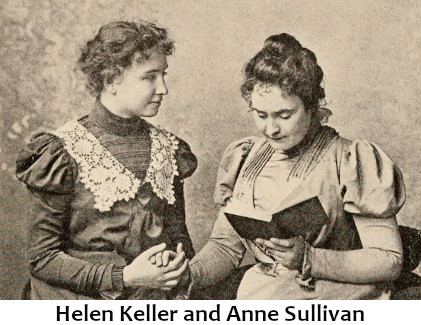Helen Keller? Anne Sullivan? Sherokee Ilse? Kathy R. Floyd? Apocryphal?

Question for Quote Investigator: The loss of a companion is heartbreaking. The following viewpoint has provided solace to many:
What we have once enjoyed and deeply loved we can never lose, for all that we love deeply becomes a part of us.
These words have been attributed to the deaf-blind social activist Helen Keller, but I have been unable to find a citation. Would you please help?
Reply from Quote Investigator: In 1929 Helen Keller published the book “We Bereaved” for individuals experiencing grief. The passage below contains two sentences that overlap the statement under investigation, and QI conjectures that these sentences were altered over time to yield the modern statement. Boldface added to excerpts by QI:1
What we have once enjoyed we can never lose. A sunset, a mountain bathed in moonlight, the ocean in calm and in storm—we see these, love their beauty, hold the vision to our hearts. All that we love deeply becomes a part of us.
Interestingly, Keller decided to communicate the idea of the enduring presence of the departed via a passage filled with visual imagery.
Here are additional selected citations in chronological order.
In 1957 Helen Keller published “The Open Door” which contained excerpts from several of her previously released books. The text above from “We Bereaved” was reprinted in “The Open Door”.2 Thus, her words achieved further distribution.
In 1990 “Empty Arms: Coping After Miscarriage, Stillbirth and Infant Death” by Sherokee Ilse contained an instance of the modern statement attributed to Keller:3
Helen Keller’s quote, “What we have once enjoyed and deeply loved we can never lose, for all that we love deeply becomes a part of us,” sets the stage beautifully for the importance of creating memories.
In 1994 “The Paris News” of Paris Texas printed a column by bereavement counselor Kathy R. Floyd that included the remark:4
I leave you with a quote from Helen Keller which might give you hope this season: “What we have once enjoyed and deeply loved we can never lose, for all that we love deeply becomes a part of us.”
In 1996 “The New Beacon Book of Quotations by Women” included an entry which cited Keller’s words in “We Bereaved”. This compact instance omitted multiple words from the original text:5
What we have once enjoyed we can never lose. All that we love deeply becomes a part of us.
Helen Keller, We Bereaved (1929)
In conclusion, Helen Keller deserves credit for the passage she wrote in “We Bereaved” in 1929. The popular modern statement is an altered version of Keller’s words.
Image Notes: Picture of Helen Keller and Anne Sullivan circa 1898 from page 17 of the May 1903 issue of “Popular Science Monthly”. Image has been cropped and resized.
Acknowledgement: Great thanks to Mardy Grothe whose inquiry led QI to formulate this question and perform this exploration.
Update History: On March 27, 2025 the format of the bibliographical notes was updated.
- 1929, We Bereaved by Helen Keller, Quote Page 2, Leslie Fulenwider Inc., New York. (Verified with scans) ↩︎
- 1957, The Open Door by Helen Keller, Quote Page 131, Doubleday & Company, Garden City, New York. (Verified with scans) ↩︎
- 1990 Copyright, Empty Arms: Coping After Miscarriage, Stillbirth and Infant Death by Sherokee Ilse, Newly Revised, Chapter: Decisions You Might Face Right Away, Quote Page 24, Wintergreen Press, Maple Plain, Minnesota. (Verified with scans) ↩︎
- 1994 December 4, The Paris News, Words for Women by Kathy R. Floyd (Services Coordinator / RTS Bereavement Counselor, The Women’s Health Resource Center of McCuistion Regional Medical Center), Quote Page 6C, Column 3, Paris, Texas. (Newspapers_com) ↩︎
- 1996 Copyright, The New Beacon Book of Quotations by Women, Compiled by Rosalie Maggio, Topic: Love, Quote Page 411, Column 1, Beacon Press, Boston, Massachusetts. (Verified with scans) ↩︎